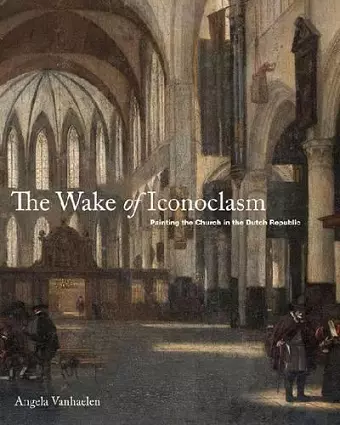The Wake of Iconoclasm
Painting the Church in the Dutch Republic
Format:Hardback
Publisher:Pennsylvania State University Press
Published:11th May '12
Currently unavailable, and unfortunately no date known when it will be back

In describing the seventeenth-century Dutch Republic, Johan Huizinga said, “Paintings could be found everywhere . . . everywhere except in churches.” Although pictures were ubiquitous in the Dutch world, the official religion expressed a fundamental distrust of visual imagery. Indeed, Calvinism and visual culture were both central modes of self-understanding in Dutch society. Investigating this paradox, The Wake of Iconoclasm takes as its main subject the numerous paintings of austere Calvinist church interiors that proliferated in the seventeenth century. Painstakingly crafted and highly naturalistic images of interiors, these peculiar paintings show spaces that were purged of visual imagery during and after the iconoclast riots of the sixteenth century. In essence, they depict the interface of the histories of art and religion. Angela Vanhaelen argues that the main function of this imagery was to stimulate debate about the transformed role of art in relation to the religious and political upheavals of the Reformation and the Dutch Revolt. Paintings of the emptied churches allowed their beholders to grapple with the significant public influence of Calvinism—especially its suppression of past cultural traditions and the new conditions of possibility it created for the visual arts.
“Seventeenth-century Dutch church paintings have been the subject of much art-historical inquiry, and this handsomely produced volume makes a valuable contribution to the discussion. . . . Vanhaelen, a recognized specialist in this area, explores the connection between church paintings and contemporary religious thought—not just Calvinism, but also Roman Catholicism and even Islam. She brings out the significance of the works’ beautiful whitewashed walls; graffiti on those walls; the power of the word and the book; the political overtones of the invasion by Louis XIV and the reconsecration of the Utrecht cathedral; and the implications of the common theme of the open grave in church floors, among much else. The book includes over 50 fine illustrations (most in color), excellent footnotes, and a full bibliography.”
—F. W. Robinson Choice
“The Wake of Iconoclasm: Painting the Church in the Dutch Republic . . . tacks a high-stakes course for the pictorial repercussions of iconoclasm: in place of the triumphant confidence, joy, even pink-cheeked bluster we have come to expect of Dutch art, Vanhaelen gives us a church interior–based realism founded on the volatile ambivalence of an age of anxiety beneath the sunny veneer of convivial charm.”
—Mia M. Mochizuki Oxford Art Journal
“[Vanhaelen] intensively and insightfully investigates the interstice between the past and present faiths and art. . . . The book is amply illustrated, with most of the key paintings reproduced in color, some accompanied by exquisite full-page color details. Some of the included illustrations are rarely reproduced in the earlier literature, particularly in such high quality.”
—Historians of Netherlandish Art
“Supported by numerous color illustrations and a healthy bibliography, this volume is certain to be an enlightening and thought-provoking read for historians and art historians of the early modern era.”
—Jacquelyn N. Coutre Sixteenth Century Journal
“This book is a significant contribution to the field of Dutch art and religious culture. Angela Vanhaelen looks closely and with fresh eyes at the images of Dutch church interiors, and with the close observation of each detail, their architectural spaces and church-attending inhabitants come alive to the reader.”
—Shelley Perlove, University of Michigan–Dearborn
“A creative and fresh approach to the study of seventeenth-century Dutch architectural paintings of church interiors.”
—Prof. dr. Mia M. Mochizuki, Jesuit School of Theology, Santa Clara University, and Graduate Theological Union, Berkeley
ISBN: 9780271050614
Dimensions: 254mm x 203mm x 23mm
Weight: 1134g
232 pages